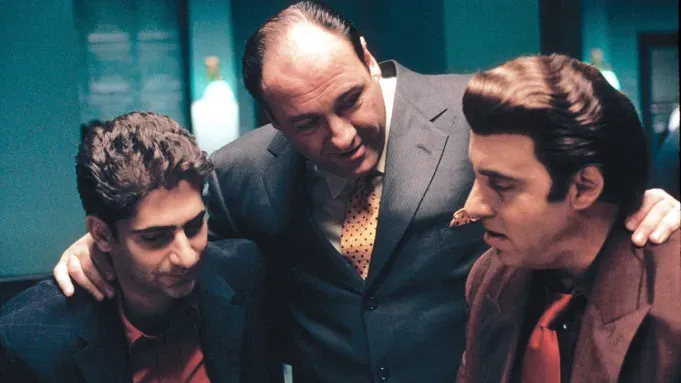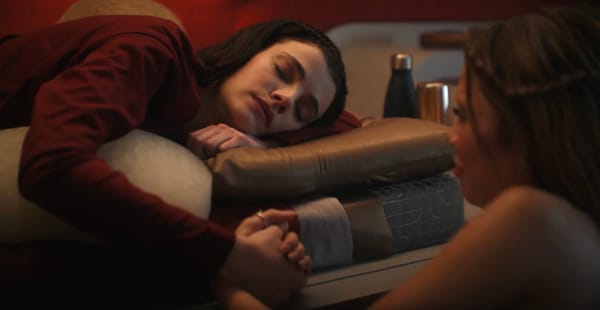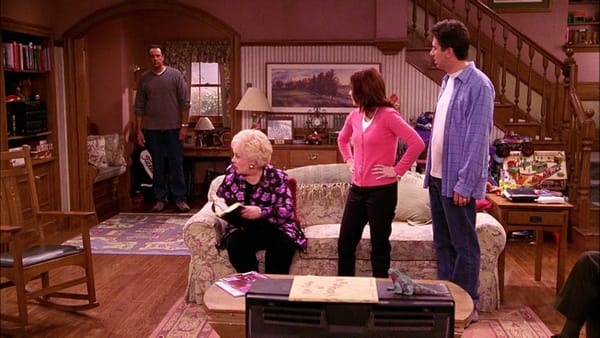The HBO America trilogy
Another half-baked schema for thinking about television from Emily VanDerWerff

Happy birthday, America! There is definitely nothing wrong with you!
Also, you make great television. It's arguably one of the things you do best, though you've been kinda struggling with that too of late. (Do you just feel a little stressed out? I get it. I don't do my best when I've got stress, too.)
But if there was a time when you were making great television almost as a matter of course, it was the 2000s, and if there was a network that was making that great television almost as a matter of course, it was HBO. And a lot of HBO's shows were about America!
Okay, they were kind of about "America," which is to say the vague idea those of us who live here have about the place. And while the shows HBO made could include creative input from women and people of color (especially in front of the camera), their creative masterminds were all white guys. So this is a decidedly narrow slice of what "America" even is.
But set all that aside, because I want to force you to think about a theory I first came up with in the mid-2000s that I have clung to all these years, despite thinking it has some holes in it. Why am I forcing you to think about it? Because it's AMERICA'S BIRTHDAY. And also because it's super late, and I just need to write a newsletter.
Anyway, the theory is this: Deadwood, The Sopranos, and The Wire, three shows that overlapped considerably during their HBO runs, form an extremely loose trilogy about America's birth, life, and death. And if you're feeling cheeky, you can toss Six Feet Under in there between Deadwood and Sopranos as a different kind of look at American life.
But I like the triptych feel of Deadwood, Sopranos, and The Wire. All three of them have aged pretty well, though Sopranos has aged best of all (a thing I would not have predicted). All three of them were created by guys named David. And all three of them are fairly directly concerned with what it means to be an American and especially what it meant to be an American in the 2000s. In fact, when I recommend these three shows to people (as I often do), I recommend watching them in roughly "chronological" order, starting with the fractious energy of Deadwood, moving on to the lethargic stasis of The Sopranos, then concluding in the dissolving entropy of The Wire.
Please note: Before I get any further in this, I'm not literally saying these shows are definitive statements about the birth, life, and death of this incredibly strange nation of mine. I'm simply saying they capture that energy. America is always being born, and America is always dying, and Deadwood and The Wire capture those respective energies. Got it?
So anyway, we start with Deadwood, David Milch's magnum opus that now, at long last, has a "proper" ending in the 2019 movie (that was the last TV review I published under my dead name). Deadwood is probably my favorite of these three shows, even as I feel like Sopranos is probably more approachable. It is perhaps a little more "Well, that's just the way it was" about its characters' blasé attitude toward the illegal occupation of the Black Hills by white settlers than I might like, but, like, those characters would have a blasé attitude about it. It's pretty clear throughout how Milch thinks about the whole deal. Yes, there is stuff in here that is very 2000s, but there's also a rich, involving portrayal of a community out at the edges of the frontier, inventing what civilization might look like. It's a story America keeps telling, at every stage of its evolution, and this is perhaps one of the best examples of that story. (Also, it's set in South Dakota, and you know how I feel about that.)
Continue on to The Sopranos, David Chase's nervy show about a country in decline that refuses to admit it's in decline and just keeps consuming more and more stuff. Of the three shows here, The Sopranos seems most interested in the gap between America as it presents itself and America as it actually is. Tony Soprano is pretty obsessed with thinking about this, to be honest. When Tony says in season one that people in this country used to "build things," he's kind of being the History Channel-loving dad he was throughout the show's run. But, uh, he's also exemplifying a sense of a country that has atrophied that a lot of folks at the time shared. When I say that Sopranos is about the "life" of the country, I mean mostly that it's about a particularly American cycle of capitalist consumption meant to stand in for a yawning fear of death's omnipresence. And honestly, it might be the single best work of American art at capturing that idea.
Finally, wrap it all up with The Wire, a show about how every American institution you can think of is fucked. Created by Ed Burns and David Simon (David!), the show is actually my least favorite of the three here, because of its occasional drift into didacticism. (Also, the show kinda got online colonized by white dudes who boiled it down to its most obvious and "cool" elements there for a while, a trend that even pissed Simon off.) But, like, this is still a television masterpiece! And there's probably no better depiction of the kinds of capitalist constriction that push great American institutions into freefall and all of the ways perfectly normal people are captured by those issues. This show is about as far left as American television was willing to get in the 2000s, and if it's less bracing now, that's mostly because it paved the way for many other shows to go much further. (I think I once compared this show to the works of Upton Sinclair, and I kind of think that comparison has stood the test of time?)
So there you have it: America in three TV shows, all from HBO. Watch them, and you'll have about as good an idea of what we're all about as anybody.
Programming note: I'm taking this week off from the Avatar recaps, because I'm on vacation! The other editions of the newsletter (like this one!) will continue as usual.
What I've been up to: This week at Vox, I published two pieces I'm really proud of, with one getting way more attention than the other. The one that got attention was my piece on Isabel Fall, a trans woman who wrote a short story, then saw her life torn apart by forces that you could sort of broadly describe as "the internet" (though you can and should drill down). This piece was a massive amount of work, and I'm so glad that it's in the world and spurring discussion.
“In a war zone, it is not safe to be unknown. Unknown travelers are shot on sight,” says Isabel Fall. “The fact that Isabel Fall was an unknown led to her death.”
Isabel Fall isn’t dead. There is a person who wrote under that name alive on the planet right now, someone who published a critically acclaimed, award-nominated short story. If she wanted to publish again, she surely could.
Isabel Fall is a ghost nonetheless.
I have to say the last two sections of the above piece might be my favorite non-fiction writing I've done ever. I even feel like I sort of came up with a rough rubric for how to decide whether to wade into an online squabble.
But I wrote another piece I'm really proud of! This one is about how all art is influenced by other art, which is why teens should really lay off my cool daughter Olivia Rodrigo. If you've read the Isabel Fall piece and not this one, check it out. The two are in conversation in ways I found interesting.
And anyway, the bigger question at hand is: Why, in an era where a sprawling amount of human artistic expression is available to us in a mere number of clicks, are we so obsessed with “originality”? The easy answer is that we’re looking for something that stands out amid the sprawling amount of human artistic expression available to us in a mere number of clicks. But I would argue we’re also looking for that originality in the wrong place.
What you missed if you're not a subscriber to Episodes: Mahevash Shaikh took on the problems with Instagram face and how it's hurting kids (and especially girls), with some tips for breaking the influence of its false beauty. And I reviewed some more Avatar episodes, the last three before the series' final plunge to the end.
As a teenager in the early 2000s, I was obsessed with what was called “natural beauty,” because back then, so was the media. Celebrities were called out for going under the knife, and female celebrities, especially, would be slammed for having a cosmetic procedure (or several). The criticism was consistent: These celebrities were plastic and not naturally beautiful.
Those days are over. With the rise of Instagram face, the natural beauty obsession is dying down. If you’re wondering what the hell Instagram face is, writer Jia Tolentino describes it as: “a young face, of course, with poreless skin and plump, high cheekbones. It has catlike eyes and long, cartoonish lashes; it has a small, neat nose and full, lush lips. The face is distinctly white but ambiguously ethnic.”
Instagram face has gone mainstream, and in the process, it has nearly killed the age-old natural beauty obsession. Altering one’s appearance as per beauty standards is no longer solely a rich person’s game. With free filters and apps, anyone can look good online.
Read me: This Vox (what a cool and hip website that is!) piece by Carlos Aguilar really digs into the ways that the sheer monolithic lack of diversity within the criticism world is hurting not just criticism but art as well. I particularly liked that the article shouts out Spike Lee's Bamboozled, which has long been a film of his I thought deserved a fairer shot.
The first time I attended a press screening — an early, private presentation of a film for critics and journalists — it felt like I was crashing an exclusive gathering I wasn’t supposed to witness. I was a 20-something DREAMer who had just qualified for a work permit through DACA; I had a community college education and worked part time at a fast food restaurant.
“Someone is going to ask me what I’m doing here,” I thought.
That was about eight years ago, when I replied to a Craigslist ad seeking writers for a small but established-enough outlet to be on the public relations and studio lists that grant some legitimacy. As someone without a car in Los Angeles, accepting the assignment from an independent publication required a long trip to Beverly Hills. I’d watch a new movie, write about it, and get published, but I wouldn’t get paid.
Watch me: The new film Summer of Soul is just a fantastic window into the summer of 1969, via the Harlem Cultural Festival. It has some astonishing musical performances, by everyone from Stevie Wonder to the Fifth Dimension, from the Staples Singers to Nina Simone. It's one of those music documentaries that makes you remember music documentaries can be more than just a boring collection of clips from the '60s.
And another thing... I don't know what to make of this, but it's pretty rad.
Opening credits sequence of the week: Happy birthday, America! Here's the opening credits sequence from the short-lived Showtime series Washingtoon, which was based on a comic strip and about somebody named Bob Forehead. Bob Forehead! What a great, all-American name!
A thing I had to look up: Nothing! I've been ranting about this for almost 15 years! I would never fact check my rants!
This week's listening music: "The City of New Orleans" by Arlo Guthrie
Episodes is published three times per week. Mondays feature my thoughts on assorted topics. Wednesdays offer pop culture thoughts from freelance writers. Fridays are TV recaps written by myself. The Wednesday and Friday editions are only available to subscribers. Suggest topics for future installments via email or on Twitter. Read more of my work at Vox.




